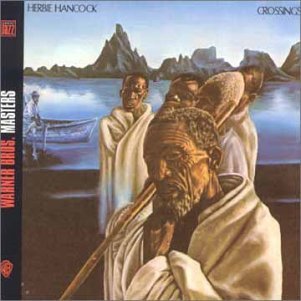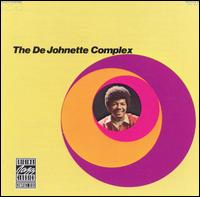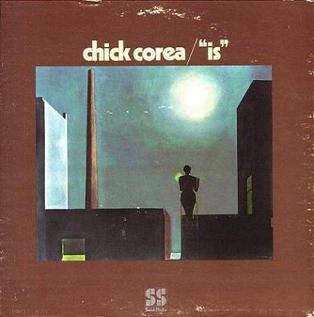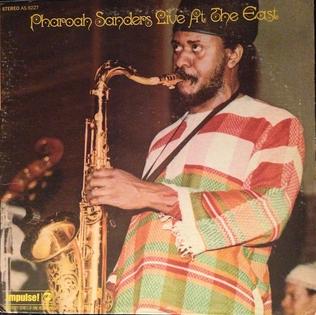
Cecil McBee is an American jazz bassist. He has recorded as a leader only a handful of times since the 1970s, but has contributed as a sideman to a number of jazz albums.

Bennie Maupin is an American jazz multireedist who performs on various saxophones, flute, and bass clarinet.
Almanac was a jazz project whose members were Bennie Maupin, Cecil McBee (bass), Mike Nock (piano) and Eddie Marshall (drums).

Sextant is the eleventh studio album by Herbie Hancock, released in 1973 by Columbia. It is the last album with the Mwandishi-era sextet featuring saxophonist Bennie Maupin, trumpeter Eddie Henderson, trombonist Julian Priester, bassist Buster Williams and drummer Billy Hart. Synthesizer player Patrick Gleeson and percussionist Buck Clarke also appear.
Bill Connors is an American jazz guitarist who was a member of Chick Corea's band Return to Forever. After leaving Return to Forever, he recorded three acoustic albums and then three electric albums as a leader/soloist.

George Andrew Cables is an American jazz pianist and composer.

Crossings is the tenth album by jazz pianist Herbie Hancock, released in 1972. It is the second album in his Mwandishi period, which saw him experimenting in electronics and funk with a sextet featuring saxophonist Bennie Maupin, trumpeter Eddie Henderson, trombonist Julian Priester, bassist Buster Williams and drummer Billy Hart. The album is the band's first to feature synthesizer player Patrick Gleeson. He was scheduled to "set up his Moog for Hancock to play." However, Hancock was so impressed with Gleeson that he "asked Gleeson not only to do the overdubs on the album but join the group."

Odyssey of Iska is the fourteenth album by American jazz composer and saxophonist Wayne Shorter, released on Blue Note Records in 1971. Musicians include guitarist Gene Bertoncini, bassists Ron Carter and Cecil McBee and drummer Billy Hart, along with multiple percussionists.
Edwin "Eddie" Marshall was an American jazz drummer.

Live at the Lighthouse is a live album by jazz trumpeter Lee Morgan, released on the Blue Note label in 1971. The album features a quintet of Morgan, Bennie Maupin, Harold Mabern, Jymie Merritt, and Mickey Roker, recorded at The Lighthouse in Hermosa Beach, California in July 1970. Originally released as a double LP comprising four side-long recordings, the 1996 CD reissue expanded the track list with over one-hundred minutes of additional material from the Lighthouse gigs. In 2021, Blue Note released an 8-CD/12-LP box set featuring the complete recordings of Morgan's three-night stint to commemorate the original album's fiftieth anniversary.

Taru is an album recorded by jazz trumpeter Lee Morgan, recorded in 1968, but not released on the Blue Note label until 1980. The album features performances by Morgan, Bennie Maupin, John Hicks, George Benson, Reggie Workman and Billy Higgins.

Together is a 1979 album by jazz pianist McCoy Tyner released on the Milestone label. It was recorded in August and September 1978 and features performances by Tyner with trumpeter Freddie Hubbard, flautist Hubert Laws, tenor saxophonist/bass clarinetist Bennie Maupin, vibraphonist Bobby Hutcherson, bassist Stanley Clarke, drummer Jack DeJohnette and percussionist Bill Summers.

The DeJohnette Complex is the debut album by Jack DeJohnette featuring Bennie Maupin, Stanley Cowell, Miroslav Vitous, Eddie Gómez, and Roy Haynes recorded in 1968 and released on the Milestone label in 1969.

Nucleus is an album by jazz saxophonist Sonny Rollins, released on the Milestone label in 1975, featuring performances by Rollins with George Duke, Raul de Souza, Bennie Maupin, Chuck Rainey, Eddie Moore, Mtume, Bob Cranshaw and Roy McCurdy. It was recorded at Fantasy Studios, Berkeley, CA, on September 2–5, 1975.

Spirit Sensitive is a hard-bop jazz album by Chico Freeman on India Navigation Records IN 1045.

In the 1970s in jazz, jazz became increasingly influenced by Latin jazz, combining rhythms from African and Latin American countries, often played on instruments such as conga, timbale, güiro, and claves, with jazz and classical harmonies played on typical jazz instruments. Artists such as Chick Corea, John McLaughlin and Al Di Meola increasingly influenced the genre with jazz fusion, a hybrid form of jazz-rock fusion which was developed by combining jazz improvisation with rock rhythms, electric instruments, and the highly amplified stage sound of rock musicians such as Jimi Hendrix. All Music Guide states that "..until around 1967, the worlds of jazz and rock were nearly completely separate." However, "...as rock became more creative and its musicianship improved, and as some in the jazz world became bored with hard bop and did not want to play strictly avant-garde music, the two different idioms began to trade ideas and occasionally combine forces." On June 16, 1972 the New York Jazz Museum opened in New York City at 125 West 55th Street in a one and one-half story building. It became the most important institution for jazz in the world with a 25,000 item archive, free concerts, exhibits, film programs, etc.

Is is the third studio album by Chick Corea, released in 1969 on Solid State Records. It features Corea with trumpeter Woody Shaw, tenor saxophonist Bennie Maupin, flautist Hubert Laws, bassist Dave Holland and drummers Jack DeJohnette & Horace Arnold. In 2002, Blue Note Records re-released all tracks from this album, together with 1969's Sundance, along with alternate takes from both albums as The Complete "Is" Sessions.

Flying Out is an album led by bassist Cecil McBee recorded in 1982 and first released on the India Navigation label.

Live at the East is a live album by American saxophonist and composer Pharoah Sanders released on the Impulse! label.

Spirits Alike is an album by the all-star jazz group The Leaders. It was recorded in August 2006 in New Jersey, and was released later that year by Double Moon Records. The album features performances by a reconstituted version of the band: original members Chico Freeman and Cecil McBee (bass) are joined by alto saxophonist Bobby Watson, trumpeter Eddie Henderson, pianist Fred Harris, and drummer Billy Hart.
















